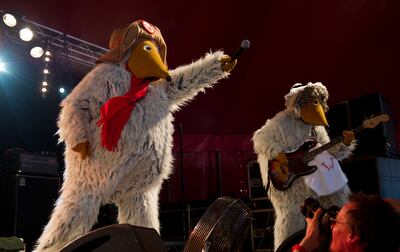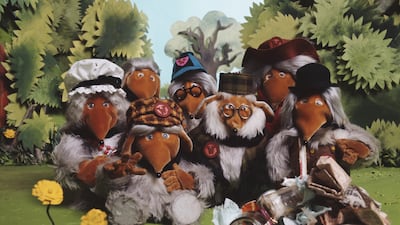They were Britain’s first eco-warriors, recycling the things everyday folks left behind, but more than half a century after they first captured viewers' hearts, The Wombles are back.
As pretty much anyone brought up in the UK in 1970s remembers, the strange, pointy-nosed, furry talking creatures were the focus of a popular TV animation series, who lived in London's Wimbledon Common.
Decades before Greta Thunberg wagged her finger at the world, The Wombles collected and recycled rubbish to use in their subterranean home.
Their practise-what-you-preach motto, Make Good Use of Bad Rubbish, was a conservation message that reflected the burgeoning environmental movement of the time.
Such was the anthropomorphic environmentalists’ enduring green credentials that they were used by the UK to promote its presidency of Cop26, when Glasgow hosted the UN environmental conference in 2021.
The characters were created by children’s author Elisabeth Beresford, with the name inspired during a Boxing Day walk on Wimbledon Common with her daughter Kate, who chirped: “Ma, isn't it great on Wombledon Common?”
“That's it. Wombles!” laughed Beresford, and the mispronunciation of the famous South-west London park entered the lexicon of the decade.
Beresford began to create magical characters with distinctly human traits who first appeared in print in 1968, being turned into a popular animated series by the BBC first screened in 1973. Actor Richard E Grant will read a new version of the introductory book on Radio 4 on Christmas Day, while next year a new CGI-animated TV remake of The Wombles will be launched. Having missed out on the decades-long merchandise boom, expectations are high that the creatures will soon be stocked in British shops.
The cartoon characters even spawned a band, who sang Remember You’re a Womble on the BBC’s legendary Top of the Pops programme, one of 52 songs written by Mike Batt, who controlled the rights to the show, along with Beresford’s children.
The characters, all of whose voices were narrated by Bernard Cribbins, spent their day "Wombling Free", as show's theme tune said, gathering litter left behind on Wimbledon Common to take to their underground warren.
They would make good use of things that they found, recycling and adapting them into quirky Heath Robinson-type items for their world, such as a fruit machine that dispensed cakes.
The idiosyncratic blend of the look of indeterminate animals with distinctly human, bumbling mannerisms, who lived in a world that seemed familiar but odd, charmed children, and probably a few adults too, during what was a tough decade for Britain.
The last BBC programme was made in 1975 but The Wombles themselves lived on and even played at the Glastonbury Festival in 2011.
After being declared bankrupt in 2016, Batt sold the 85 per cent controlling stake he owned in Wombles Copyright Holdings Ltd to businessman Craig Treharne, who is behind the recently announced revival of the show.
He is teaming up with production company Altitude and though few details have so far been released, CGI versions of the creatures have appeared on the company’s Facebook page.

Batt has spoken of his sadness at being frozen out of the world he had helped to create.
“I am very unhappy about the way the acquisition was done. I would have liked to have retained the right to look after the music,” he declared in 2020.
Such is his association with his furry friends that his wife once told him that even if he invented a cure for cancer, he would “still always be The Wombles man”.
“But it was done so quickly that I pretty much had to agree to forgo my position, which I'd enjoyed ever since I began writing the hits and making The Wombles as famous as they were. I had to step aside from that. That was sad.”
The sale also appeared to rankle Marcus Robertson, Beresford’s son, who said the family had an agreement with Batt that they would have first refusal to buy back the rights.
“It's a fight for the soul of The Wombles. I feel we're being held hostage,” he said.
“We've never owned all the rights but we've always had respect for the idea that The Wombles came from my mother's head. Now that's all gone.”
Three years on, the dust appears to have settled and we are set to see the familiar characters, many of which are based on members of Beresford’s family, once again.
Beresford, who died in 2010, originally planned to use a map of the London Underground to choose the names of her characters but instead used a 100-year-old atlas to pick out places as inspiration, with characteristics shaped by her own family members.

Names stemmed from the Orinoco river in Venezuela, the Russian city of Tomsk, the eastern European country of Bulgaria behind the Iron Curtain, Wellington, the capital of New Zealand, and Tobermory, a fishing town on the Isle of Mull.
There’s Great Uncle Bulgaria, the gruff but kindly head of the burrow, who passes his day reading The Times and doing the crossword, his second-in-command Tobermory, whose practical skills are put to good use recycling rubbish, the work-shy Orinoco, absent-minded by clever Wellington and the feisty Madame Cholet, the apparently French cook.
Meanwhile, The Wombles have been bringing their environmental message to a younger generation of fans.
As well as being mascots as Cop26, they have featured in a wide range of environmental campaigns including the annual Great British Spring Clean and the Great Big School Clean, as well as tree-planting, beach-cleaning and recycling schemes.
It seems they are having an impact. A YouGov survey revealed 88 per cent of the British public are aware of The Wombles.
Batt seems to have made his peace and recently told The Times about how The Wombles came along in the 1970s during economically challenging times to cheer up the nation and are once again able to put a smile on our faces.
But he warned it’s “important that The Wombles don’t become preachy” because when “we started it, being environmentally friendly was important but now it has become vital”.
Robertson reflected on the five decades since the much-loved environmental pioneers made their TV debut and how their message is relevant today.
“I think for her [Beresford] the fact that she just based it all on members of the family and that it’s still going and it’s still relevant, she would love that.”
He explained how The Wombles have such a resonance for him, as his mother explained that Great Uncle Bulgaria is based on her children's paternal grandfather.
“It’s just a brilliant thing because I can literally turn on the TV or go on YouTube and there’s my family," he said. "It’s amazing and she would love that."


